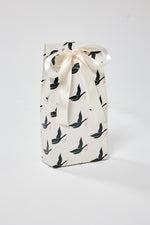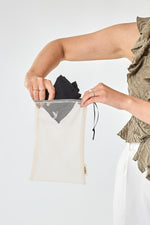Why, despite ethical beliefs, do many consumers continue to buy fast fashion? And how can we change this behavior?
A growing ethical awareness... but not enough
The figures are clear: according to ADEME, 73% of French women say they are ready to consume less but better when it comes to fashion. However, the reality of sales shows the continued success of fast fashion brands.
This paradox raises the question: why do we continue to buy mass-produced clothing, with high environmental and social costs, even though we know the excesses?
The invisible weight of psychological brakes
1. The price: a false assumption
Yes, sustainable products come at a higher price. But this price reflects real costs: decent wages, quality materials, local production, and sustainability. On the other hand, fast fashion offers items at very low prices... but with very short lifespans.
At Cygnes , our tights are designed to last up to 50 times. A profitable investment in the long term.
2. Immediate availability
The fast fashion model caters to the desire for instant gratification: you click, you receive it the next day. Responsible brands, on the other hand, often produce in smaller batches, with longer lead times.
3. Marketing hype
Major fast fashion brands have massive advertising budgets, influence social media, and heavily sponsor content creators. This creates a sense of "loss" in the face of new products that are perceived as essential.
4. Social pressure and self-image
Changing clothes frequently remains associated with the idea of novelty, style, and the ability to keep up with trends. Tights that last five seasons are not yet an object of social value. We must therefore also evolve our imaginations.

Making sustainable fashion desirable
At Cygnes , we believe that we must stop blaming ourselves and instead offer support. Transformation comes through desire, pride, and beauty.
Neat packaging, clear aesthetics
Our tights are designed as true designer objects. Their durability is invisible, but their style is assertive.
A transparent speech, but never guilt-inducing
We believe in collective responsibility, not individual shaming. We prefer to demonstrate the positive impact that can be achieved, rather than denounce it.
A rewarding customer experience
Careful ordering, responsive customer service, and a recycling program for old tights: every interaction is designed to encourage a lasting connection.
How to change behaviors?
Changing the collective discourse on “value”
We need to restore meaning to quality, know-how, and repair. We need to show that longevity is an act of style, not a constraint.
-
Making visible what is invisible
Fast fashion hides its real costs: pollution, exploitation, transportation. The role of committed brands is to bring this reality to light, without dramatizing, but firmly.
Accepting imperfection
No one is 100% consistent. And that's not the goal. Rather, it's about building a more conscious, more mindful, and longer-term relationship with our clothes.

Product focus: sustainable everyday essentials
Our tights from 30D to 600D
Ultra-resistant and OKEO TEX certified yarns
Designed and manufactured in France
High-end finishes and optimal comfort



